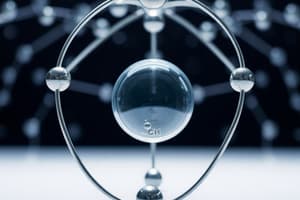Podcast
Questions and Answers
What is the primary focus of stoichiometry in chemical reactions?
What is the primary focus of stoichiometry in chemical reactions?
- The study of molecular shapes
- The identification of chemical bonds
- The analysis of energy changes
- The calculation of amounts of reactants and products (correct)
How are elements arranged in the periodic table?
How are elements arranged in the periodic table?
- By increasing atomic number (correct)
- By the number of electron shells
- By decreasing atomic mass
- By the type of chemical bonds they form
Which statement is true regarding acids and bases?
Which statement is true regarding acids and bases?
- Acids and bases both produce hydroxide ions
- Acids donate protons (H⁺ ions) in solution (correct)
- Acids accept protons, while bases donate protons
- Base solutions always have a pH below 7
What does the pH scale measure?
What does the pH scale measure?
What is a key characteristic of organic chemistry?
What is a key characteristic of organic chemistry?
What primarily defines the element of an atom?
What primarily defines the element of an atom?
Which of the following is a physical property of matter?
Which of the following is a physical property of matter?
What type of bond involves the sharing of electrons between atoms?
What type of bond involves the sharing of electrons between atoms?
Which statement correctly describes chemical reactions?
Which statement correctly describes chemical reactions?
What characterizes the liquid state of matter?
What characterizes the liquid state of matter?
Which of the following best describes ionic bonding?
Which of the following best describes ionic bonding?
What is true about intermolecular forces?
What is true about intermolecular forces?
Which of the following statements about matter is incorrect?
Which of the following statements about matter is incorrect?
Flashcards
What is stoichiometry?
What is stoichiometry?
The study of the quantitative relationships between reactants and products in chemical reactions. It involves calculating the amounts (moles) of substances involved in chemical reactions.
How are elements organized in the periodic table?
How are elements organized in the periodic table?
The periodic table organizes elements based on their atomic structure and properties. Elements are arranged by increasing atomic number. Elements with similar properties are placed in the same column (group or family). Elements in the same row (period) exhibit gradual changes in their properties.
What are acids and bases?
What are acids and bases?
Acids donate protons (H⁺ ions) in solution. Bases accept protons or donate hydroxide ions (OH⁻) in solution. The pH scale measures the acidity or basicity of a solution.
What is the focus of organic chemistry?
What is the focus of organic chemistry?
Signup and view all the flashcards
What is vaporization?
What is vaporization?
Signup and view all the flashcards
What is Chemistry?
What is Chemistry?
Signup and view all the flashcards
What is matter?
What is matter?
Signup and view all the flashcards
What are the states of matter?
What are the states of matter?
Signup and view all the flashcards
What are physical properties?
What are physical properties?
Signup and view all the flashcards
What are chemical properties?
What are chemical properties?
Signup and view all the flashcards
What is an atom?
What is an atom?
Signup and view all the flashcards
What is chemical bonding?
What is chemical bonding?
Signup and view all the flashcards
What is a chemical reaction?
What is a chemical reaction?
Signup and view all the flashcards
Study Notes
Introduction to Chemistry
- Chemistry is the scientific study of matter, its properties, composition, and the changes it undergoes.
- It encompasses a vast range of topics, from fundamental building blocks like atoms and molecules to complex interactions within living organisms.
- Chemistry plays a crucial role in fields like medicine, materials science, and environmental science.
Matter and its Properties
- Matter is anything that occupies space and has mass.
- Matter exists in three fundamental states: solid, liquid, and gas.
- Properties of matter are categorized as physical and chemical.
- Physical properties describe substance characteristics without changing composition. Examples include density, melting point, and boiling point.
- Chemical properties describe how a substance interacts with others to undergo a chemical reaction. Examples include flammability and reactivity with acids.
Atomic Structure
- All matter is composed of atoms.
- An atom has a nucleus containing protons and neutrons, surrounded by electrons.
- Protons carry a positive charge, electrons a negative charge, and neutrons are neutral.
- The number of protons defines an element.
- Electron arrangement determines chemical behavior.
Chemical Bonding
- Atoms form molecules or ionic compounds through bonding.
- Covalent bonds form by sharing electrons between atoms.
- Ionic bonds form by transferring electrons, creating oppositely charged ions that attract.
- Metallic bonding involves sharing valence electrons among multiple atoms.
- Intermolecular forces attract molecules and influence physical properties.
Chemical Reactions
- Chemical reactions rearrange atoms to form new substances.
- Chemical equations represent reactions using chemical formulas.
- Reactants are the initial substances, and products are the resulting substances.
- Balancing chemical equations ensures equal atoms of each element on both sides.
- Chemical reactions often involve energy changes (exothermic or endothermic).
States of Matter
- Solids have a fixed shape and volume.
- Liquids have a fixed volume but take the container shape.
- Gases have neither fixed shape nor volume; they expand to fill their container.
- Phase transitions involve changes between these states (melting, freezing, vaporization, condensation).
Stoichiometry
- Stoichiometry studies quantitative relationships between reactants and products in a chemical reaction.
- It involves calculating amounts (moles) of substances in reactions.
- Stoichiometry calculations depend on balanced chemical equations and molar masses.
Periodic Table
- The periodic table organizes elements based on atomic structure and properties.
- Elements are arranged by increasing atomic number.
- Elements with similar properties are in the same column (group or family).
- Elements in the same row (period) show gradual property changes.
Acids and Bases
- Acids and bases are important compound classes.
- Acids release protons (H⁺ ions) in solution.
- Bases accept protons or release hydroxide ions (OH⁻) in solution.
- The pH scale measures solution acidity/basicity.
Organic Chemistry
- Organic chemistry focuses on carbon-containing compounds.
- Carbon forms the backbone of many complex molecules, including biomolecules like carbohydrates, proteins, and lipids.
- Most living organisms are made from and utilize organic molecules and compounds.
- Functional groups are specific atom groups within organic molecules that determine their chemical properties.
Studying That Suits You
Use AI to generate personalized quizzes and flashcards to suit your learning preferences.




